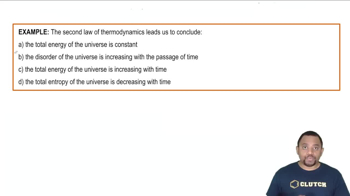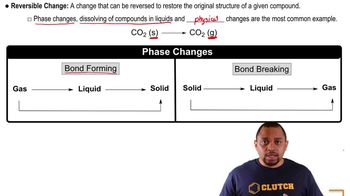The normal freezing point of n-octane (C8H18) is -57 °C. (b) In what temperature range is the freezing of n-octane a spontaneous process?
Indicate whether each statement is true or false. (a) ΔS is a state function. (b) If a system undergoes a reversible change, the entropy of the universe increases. (c) If a system undergoes a reversible process, the change in entropy of the system is exactly matched by an equal and opposite change in the entropy of the surroundings. (d) If a system undergoes a reversible process, the entropy change of the system must be zero.
 Verified step by step guidance
Verified step by step guidance
Verified Solution
Key Concepts
State Functions

Entropy and the Second Law of Thermodynamics

Reversible Processes

The normal freezing point of n-octane (C8H18) is -57 °C. (d) Is there any temperature at which liquid n-octane and solid n-octane are in equilibrium? Explain.
A system goes from state 1 to state 2 and back to state 1 following a reversible path in both directions. Which of the following statements about this process is or are true?
c. The value of w on going from state 1 to state 2 is equal in magnitude and opposite in sign to the value of w on going from state 2 back to state 1.
The normal boiling point of Br2(l) is 58.8 °C, and its molar enthalpy of vaporization is ΔHvap = 29.6 kJ/mol. (a) When Br2(l) boils at its normal boiling point, does its entropy increase or decrease?
The normal boiling point of Br2(𝑙) is 58.8 °C, and its molar enthalpy of vaporization is Δ𝐻vap=29.6 kJ/mol. (b) Calculate the value of Δ𝑆 when 1.00 mol of Br2(𝑙) is vaporized at 58.8 °C.
The element gallium (Ga) freezes at 29.8 °C, and its molar enthalpy of fusion is ΔHfus = 5.59 kJ/mol. (a) When molten gallium solidifies to Ga(s) at its normal melting point, is ΔS positive or negative?
